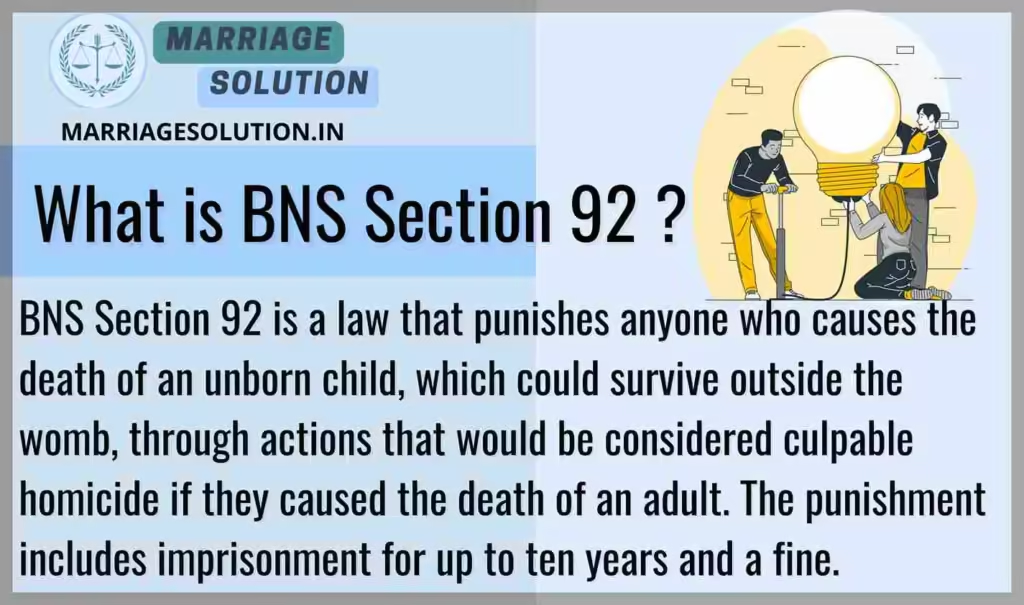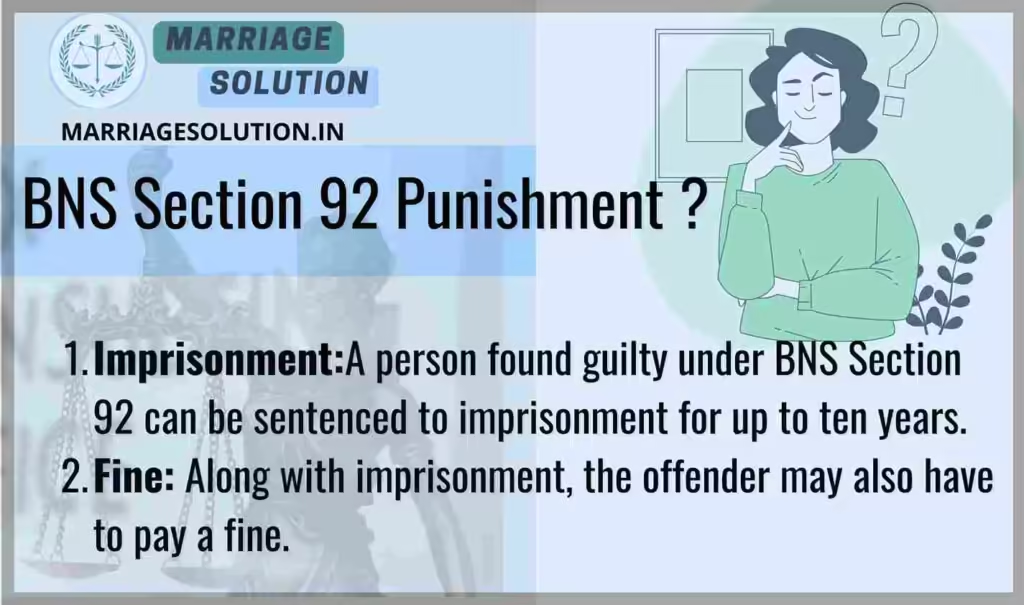Introduction of Section 92 BNS
BNS Section 92, has introduced several provisions to strengthen protections for women and unborn children. Section 92 deals with cases where the death of a “quick unborn child” is caused by an act that would amount to culpable homicide if it had resulted in the death of a person. In simple terms, this law punishes situations where a violent or reckless act against a pregnant woman leads to the loss of a developed fetus capable of movement in the womb. By treating such acts as serious crimes, Section 92 highlights the importance of safeguarding unborn life while ensuring offenders face strict consequences.
The Bharatiya Nyaya Sanhita (BNS) Section 92 replaces the old Indian Penal Code (IPC) Section 316.
- Introduction of Section 92 BNS
- What is BNS Section 92?
- Bare Act – BNS Section 92 – Causing Death of Quick Unborn Child by Act Amounting to Culpable Homicide
- Section 92 BNS Overview
- BNS 92 Punishment
- BNS 92 bailable or not ?
- Bharatiya Nyaya Sanhita Section 92
- Conclusion
- Difference Between BNS Section 92 and IPC Section 316
- BNS Section 92 FAQs
- Need Legal Support?
What is BNS Section 92?
BNS Section 92 is a law that punishes anyone who causes the death of an unborn child, which could survive outside the womb, through actions that would be considered culpable homicide if they caused the death of an adult. The punishment includes imprisonment for up to ten years and a fine.

BNS Section 92 – Causing Death of Quick Unborn Child by Act Amounting to Culpable Homicide
“Whoever does an act under such circumstances that, if it caused death, it would amount to culpable homicide, and that act results in the death of a quick unborn child, shall be punished with imprisonment of either description for a term which may extend to ten years, and shall also be liable to fine.”
Detailed Explanation in Simple Language
- Who can be punished?
- The section applies to any person who commits an act dangerous enough that, if it killed a human being, it would be treated as culpable homicide.
- If such an act instead kills a quick unborn child (a fetus that has developed enough to move in the womb), the offender is punishable.
- Key element – Act amounting to culpable homicide
- The act must be of such a serious nature that, if directed against a living person, it would amount to culpable homicide.
- Example: stabbing, poisoning, or violently kicking a pregnant woman.
- What is a “quick unborn child”?
- The law uses the term to describe a fetus that has developed enough to show movements inside the womb (usually after 4–5 months).
- The death of such a fetus due to an intentional act is treated as a grave offense.
- If the unborn child dies because of the act
- The crime is committed even if the pregnant woman survives but the fetus dies.
- Example: A pregnant woman is attacked violently, she survives, but the fetus dies. The attacker is guilty under Section 92.
- Punishment
- Imprisonment of up to 10 years, and
- Fine (the amount depends on the court’s decision).
- This punishment reflects the seriousness of treating the unborn child’s death as nearly equivalent to culpable homicide.
- Knowledge of death not essential
- The offender need not know that the act would result in the fetus’ death.
- If the act is dangerous and it causes the death of a quick unborn child, liability arises.
- Legal Nature of the Offense
- Cognizable: Police can arrest without a warrant.
- Non-bailable: Bail is not automatic; only the court can decide.
- Triable by: Court of Session (a higher criminal court).
Illustrations (Examples)
Example 2: A pregnant woman is kicked during a fight. She survives, but the fetus, which had already started moving inside her, dies. The offender is guilty under this section.
Example 1: A person stabs a pregnant woman in the stomach. The woman survives, but her six-month fetus dies. This is punishable under Section 92.
Section 92 BNS Overview
BNS Section 92 is a law that punishes anyone who causes the death of an unborn child, which could survive outside the womb, through actions that would be considered culpable homicide if they caused the death of an adult. The punishment includes imprisonment for up to ten years and a fine.
BNS Section 92: 10 Key Points
- Protection of the Unborn Child: BNS Section 92 specifically protects unborn children who have reached a stage in their development where they could survive outside the womb. This law recognizes the importance of protecting life even before birth.
- Acts Leading to Culpable Homicide: If a person’s actions could be considered culpable homicide (unlawful killing) if they resulted in the death of an adult, and those same actions cause the death of an unborn child, the person is held accountable under this section.
- Severe Penalties: The law imposes severe penalties for causing the death of a quick unborn child. This includes imprisonment for up to ten years, reflecting the gravity of the offense.
- Liability for Fine: In addition to imprisonment, offenders may also face a financial penalty, or fine, which further emphasizes the seriousness of the crime.
- Cognizable Offense: A cognizable offense means that the police have the authority to arrest the accused without a warrant. This indicates that the crime is treated with urgency and seriousness.
- Non-Bailable Offense: Being a non-bailable offense means that the accused cannot easily secure bail, and is likely to remain in custody throughout the trial process. This is due to the severity of the crime.
- Triable by Court of Sessions: Cases under this section are heard in the Court of Sessions, a higher court that handles serious criminal matters. This ensures that the case is given the appropriate legal attention.
- Illustration of the Offense: The law provides an example to explain the offense. For instance, if a person knows that their actions are likely to cause the death of a pregnant woman and proceeds anyway, resulting in the death of the unborn child, they are guilty under this section.
- Intent is Crucial: The section specifically targets actions done with the knowledge or intent that they could cause death. Even if the offender does not know that their actions will lead to the death of an unborn child, they are still responsible if it happens.
- Not Just About the Woman’s Life: The law emphasizes that even if the act does not result in the death of the pregnant woman, but leads to the death of her unborn child, the offender is still punishable under this section.
Example 1: If a person deliberately causes an accident knowing that a pregnant woman is in the vehicle and this act results in the death of her unborn child, they could be charged under BNS Section 92.
Example 2: If a person assaults a pregnant woman, knowing that their actions could harm her unborn child, and the child dies as a result, this would also fall under this section.
BNS 92 Punishment
Imprisonment: A person found guilty under BNS Section 92 can be sentenced to imprisonment for up to ten years.
Fine: In addition to imprisonment, the person may also be required to pay a fine, reflecting the seriousness of the crime.

BNS 92 bailable or not ?
BNS Section 92 is a non-bailable offense, meaning that obtaining bail is difficult, and the accused is likely to remain in custody during the trial.
Difference Between BNS Section 92 and IPC Section 316
| Section | Offense | Punishment | Cognizable? | Bailable? | By What Court Triable |
|---|---|---|---|---|---|
| BNS Section 92 | Causing the death of a quick unborn child by an act which, if it caused death, would amount to culpable homicide. | Imprisonment of either description for a term which may extend to 10 years, and liable to fine. | Cognizable — police can arrest without warrant | Non-Bailable | Court of Sessions |
| IPC Section 316 (Old) | Causing the death of a quick unborn child by an act amounting to culpable homicide (same core offence). | Imprisonment of either description for a term which may extend to 10 years, and liable to fine (same as BNS). | Cognizable — police can arrest without warrant | Non-Bailable | Court of Sessions |
BNS Section 92 FAQs
What is a “quick unborn child”?
A “quick unborn child” refers to a fetus that has developed enough to survive outside the womb.
What kind of acts are covered under BNS Section 92?
Acts that would be considered culpable homicide if they caused the death of a person are covered if they result in the death of a quick unborn child.
Can someone be arrested without a warrant under this section?
Yes, the offense is cognizable, allowing for arrest without a warrant.
Is BNS Section 92 a bailable offense?
No, it is non-bailable, meaning bail is not easily granted.
Which court handles cases under BNS Section 92?
Cases under this section are triable by the Court of Sessions.
Conclusion
BNS Section 92 ensures that the death of a developed unborn child due to violent or reckless acts is treated with the same seriousness as culpable homicide. By prescribing up to 10 years of imprisonment and fines, this section emphasizes the sanctity of unborn life while ensuring accountability for offenders. It continues the legacy of IPC 316 under the modern criminal code, reinforcing India’s commitment to protecting mothers and unborn children.
Need Legal Support?
If you are dealing with court cases, marriage problems, or any other legal issue, our team at Marriage Solution – Lawyer Help is here for you. Simply fill out our quick online enquiry form, and we’ll connect you with the right legal expert to support your needs.
Finished with BNS 92 ? Continue exploring the next provisions of the Bharatiya Nyaya Sanhita (BNS), 2023. Each section includes explanations, examples, and plain-language breakdowns for easy understanding.
Of Offences Against Child
- Section 93 BNS : Exposure and abandonment of child under twelve years, by parent or person having care of it
- https://marriagesolution.in/bns_section/section-93-bns/
- BNS 94 : Concealment of birth by secret disposal of dead body .
- https://marriagesolution.in/bns_section/bns-94/
- Section 95 BNS : Hiring, employing or engaging a child to commit an offence .
- https://marriagesolution.in/bns_section/section-95-bns/
- BNS Section 96 : Procuration of child .
- https://marriagesolution.in/bns_section/bns-section-96/
- BNS Section 97 : Kidnapping or abducting child under ten years with intent to steal from its person .
- https://marriagesolution.in/bns_section/bns-section-97/
Full IPC Section List: https://marriagesolution.in/ipc-section-list
All Indian Law & Blogs: https://marriagesolution.in/indian-law/
Full BNSS Section List: https://marriagesolution.in/bnss_section-list
